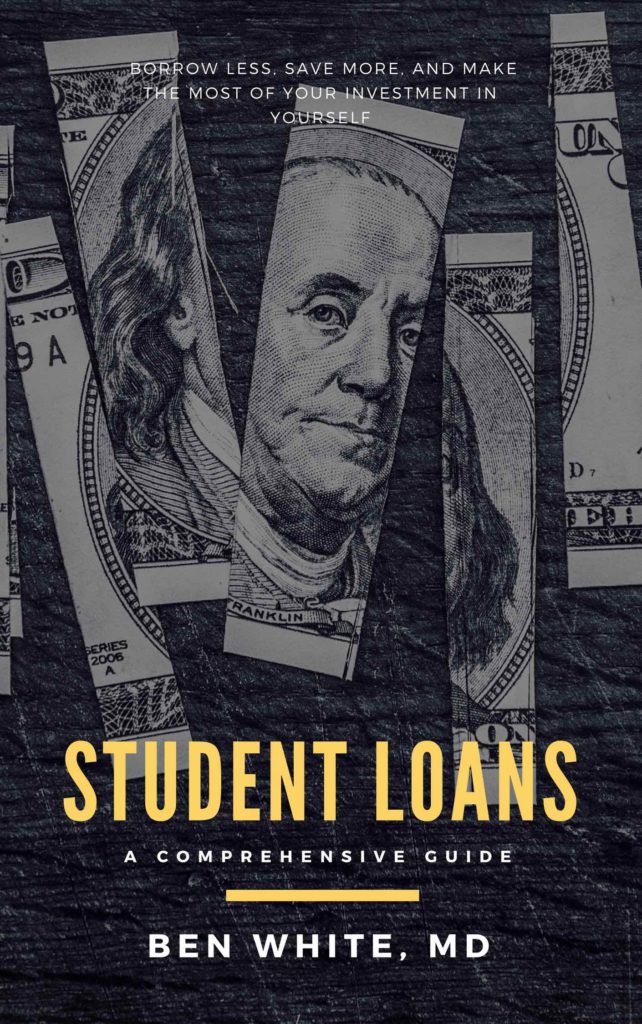I just released my third book. OK, it’s really more like my 2.5th book, because Student Loans: A Comprehensive Guide is a line-by-line reworking and expansion of my second book, Medical Student Loans: A Comprehensive Guide.

As with all of my longer projects, I drastically underestimated the amount of effort and time it would take to complete this task, as this book still took the better part of a year to complete.
Student Loans is temporarily exclusively available on the Kindle platform, and I’m running a free book promotion until the end of Friday.
So, if you are or will be a physician, read my other book; I wrote it just for you, and there’s nothing else like it.
If you’re anything else, please enjoy this new book (for free), and tell your friends who are in school, have been in school, or will be in school to get their free copy now (there’s nothing else like it).
6 Comments
Hello Dr White,
I tried to acquire your new book for free on Amazon via the link you provided. However, Amazon wants my credit card information in exchange for “joining” Kindle Unlimited for 30 days (insert Amazon bait/switch verbiage here).
How does one acquire your “free book” without providing one’s credit card information? Russians, bots, conspiracy theorists and all that.
спасибо (Thank you via Google Translate!)
Click the “Buy Now for Free” button, which buys a permanent copy of the book for free, instead of the “Read for Free” Kindle Unlimited button above that, which signs you up for Amazon’s KU free trial.
I got it and read through it. Thank you. I also downloaded the sample from your new book for medical students.
I may have missed it but I did not see where you listed alternative sources for funding one’s education (beyond “the bank of mom and dad”). I have been surprised how medical students fail to approach their rich uncle, aunt, parents’ friends, personal contacts from former, present or future employers (medical industry, medical groups, etc), church members, etc for private loans. The terms are sweet and there is room for quid pro quo basis. It takes one to grovel but then again, we are all beggars (e.g. Saint Mother Teresa of Calcutta) and we might as well put it to good work for a greater goal.
Thanks again
The medical student book is actually the original one. It’s tailored for doctors and has a few sections dedicated to the nuances of PSLF and repayment for residents but contains the same core. While I’d recommend that doctors read that version, there isn’t too much extra to be gained from reading both.
It’s true I could probably expand that bit. Church, community, religious groups, local societies etc. There is mention of private school based/institutional loans/etc, but there are some downsides to that angle as well. For one, you definitely have to pay it back. As you saw the book is largely concerned with dealing with federal loans as effectively as possible, so there’s room for improvement there.
I’ll freely admit I have never met a single person who had their medical school paid for by future employer (have you?). A masters degree like an MBA, sure, but never med school. Having an employer pay for med school retroactively is a different story, that’s covered in the non-federal forgiveness chapter. Even merit scholarships for med school are extremely rare, say compared with undergrad.
I have known a few individuals who had their medical education paid by a former employer (medical organization, social service organization, etc) with a commitment to serve them down the road as a staff physician. However, I wrote a rather long list of alternative sources of funding for private loans that ticked off individuals other than former employers…”their rich uncle, aunt, parents’ friends, personal contacts from former, present or future employers (medical industry, medical groups, etc), church members, etc for private loans.”
Pursuing any financial endeavor invariably means partnering with others (I used the word ‘grovel’ for a reason) to make it happen. There are always individuals in our midst with personal wealth and some, if approached properly, might be willing to serve as angel investors. Something about ROI and all that. Fed loans are a rip off, but you already know that.
Good $elling
Ah, a former employer sounds more plausible. I was just wondering if you’d met someone who had a prospective employer do so. A signing bonus as a resident is the only thing I’ve ever seen like that. I agreed with the rest of your expanded list as above, something I’ll need to tackle in the next revision, thanks.